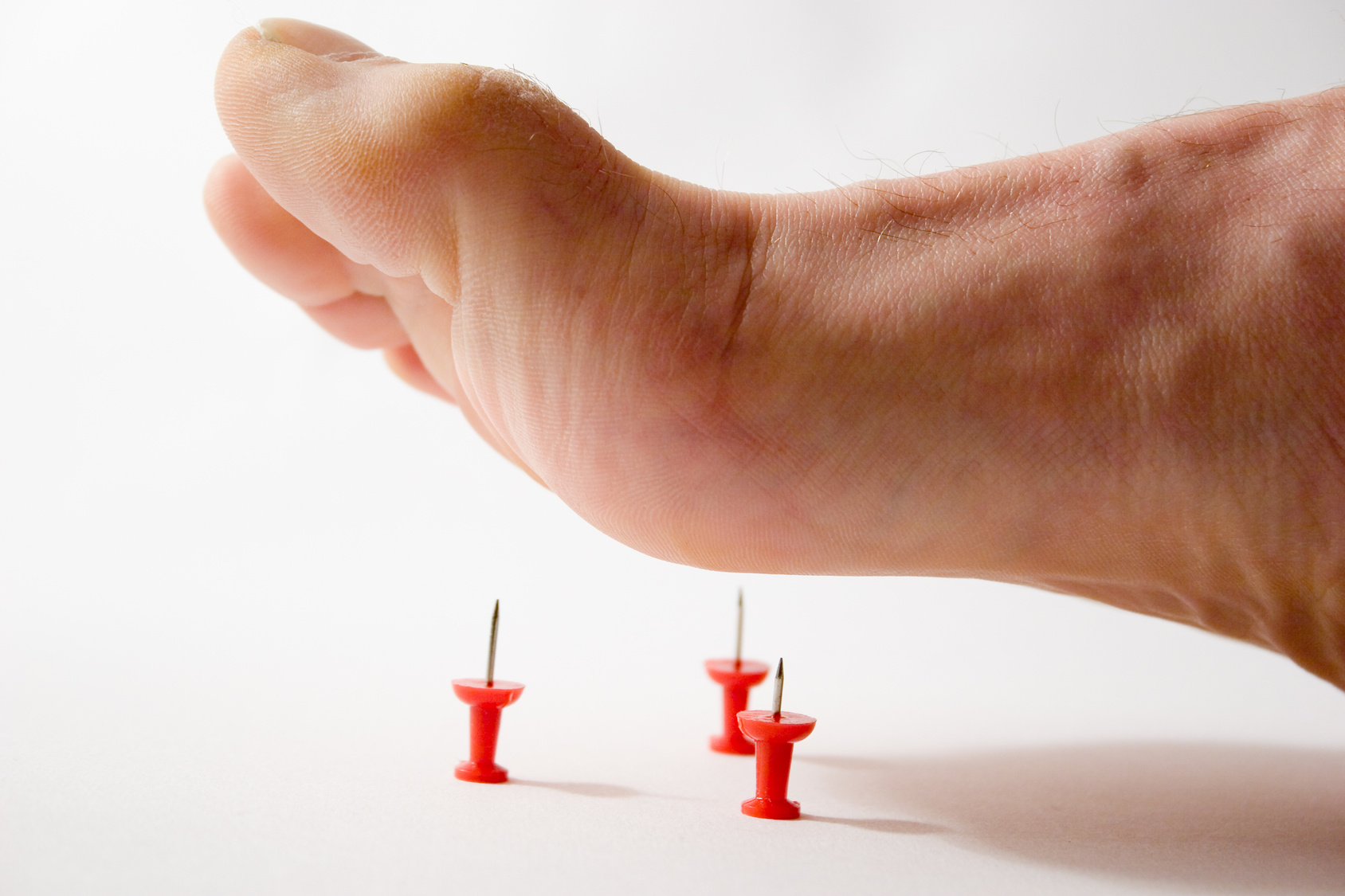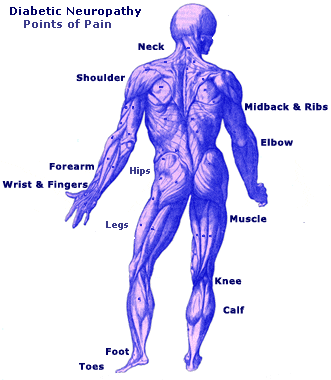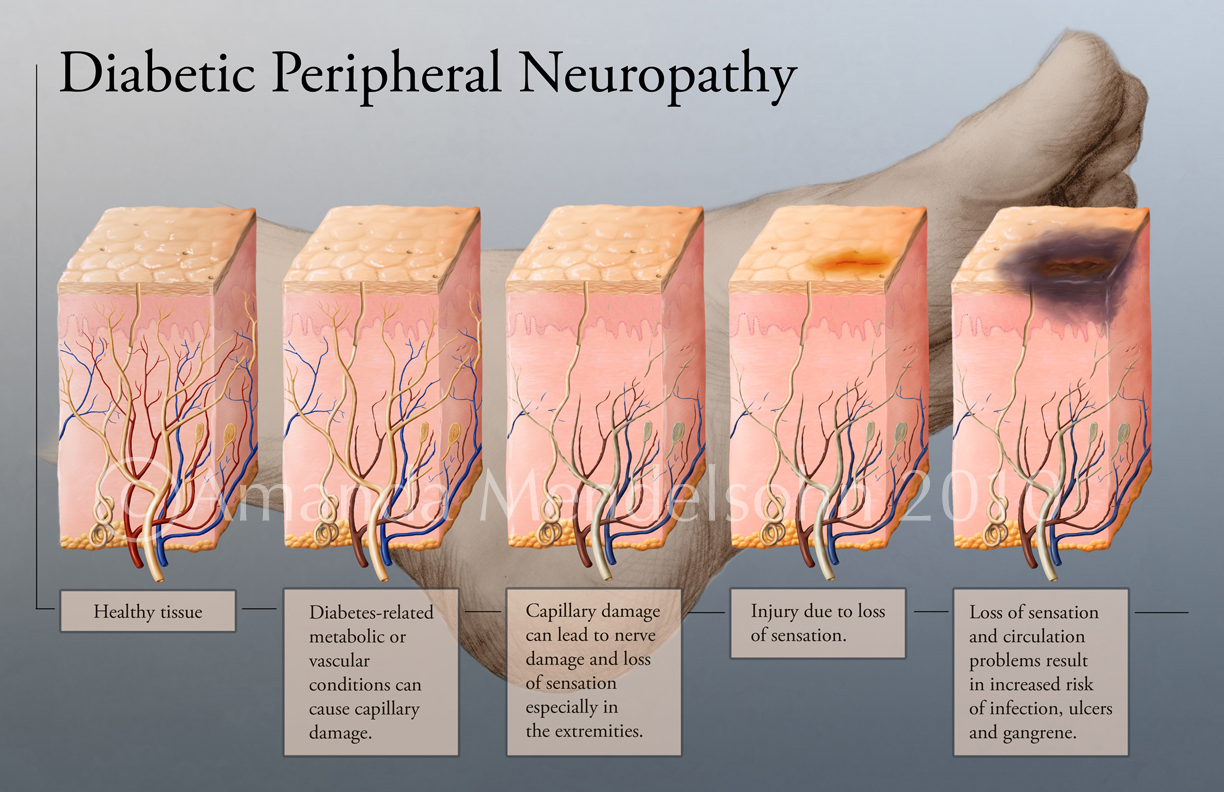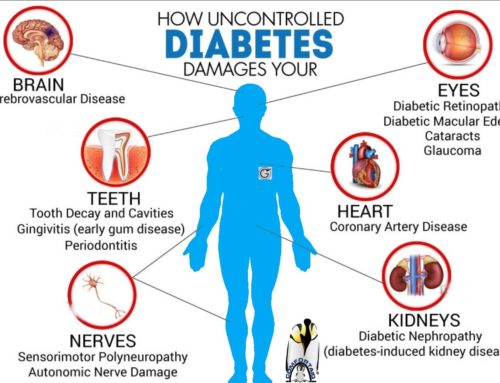What is Diabetic Neuropathy?
A common condition caused by high blood glucose level is nerve damage know as diabetic neuropathy. Nerves are found throughout our body. They are responsible for everything we feel, from warmth and cold to pain. They also play a vital role in controlling our heart rate, digestive system, bladder control and sexual function. High blood glucose level can, over time, cause damage to nerves through out the body causing symptoms in every organ system. In diabetics the damage most commonly involves the longest nerves first (those in the feet and toes) resulting in loss of sensation and numbness. If left untreated, it can lead to complete loss of feeling and spread to legs and hands.
Diabetic neuropathy can occur in both Type 1 and Type 2 diabetics due to prolonged high blood glucose level. It occurs in nearly half the diabetics but not everyone with nerve damage develops symptoms. In those who do develop symptoms, they can range from mild to severe. Diabetics can develop nerve damage anytime, but the risk increases with long duration of diabetes or poorly controlled blood sugar. It is especially common among those who have had diabetes for at least 20-25 years.
Diabetic Neuropathy is the most common complication of diabetes. But you can prevent or slow its progression by healthy lifestyle and strict blood glucose control.
What causes diabetic neuropathy?
Diabetic Neuropathy is caused by interaction among a number of factors. It is most commonly caused by prolonged levels of high blood glucose. However, research has shown that tight blood glucose control, although decreases the risk of developing neuropathy, does not eliminate it completely. This suggests other factor such as genetic and environmental factors may also be involved.
High Blood Glucose Damages Nerves and Blood Vessels:
- Nerves carry messages back and forth between the brain and other parts of the body. Small blood vessels provide nerves with nutrients and oxygen required to survive and function. Your nerves are extremely sensitive to any change in nutrients and oxygen supply. High blood glucose damages these small blood vessels that feed the nerves. When the vessels are damaged, a sufficient supply of nutrients and oxygen no longer reaches the nerve, causing the nerve to become damaged and eventually die.
- High blood glucose also damages the outer protective layer of nerves, affecting their ability to transmit signals. This results in incorrect signals being sent to the brain causing chronic pain.
Other Factors Contributing to Nerve Damage Include:
- Genetic Factors
Some people are more susceptible to nerve damage indicating a possible role of genetics. - Autoimmune factors
in which the immune system mistakenly attacks your own nerves as if they are foreign. This results in nerve inflammation resulting in interference with transmission of signals. - Mechanical injury to nerves
What are the risk factors?
- Age >40 years
- Long duration of diabetes – especially if you’ve diabetes for >20 years
- Periods of poor glucose control – this is the greatest risk factor for all diabetic complications.
- Smoking – narrows and hardens the arteries, reducing blood flow and causing nerve damage.
- Kidney disease – Diabetics with kidney problems are more likely to develop neuropathy
- Eye disease
- Excessive alcohol consumption
- High blood pressure
- High blood cholesterol
- Ischemic heart disease
What are the types of diabetic neuropathy and their Symptoms?
Diabetic neuropathy can be divided into four types depending on the location and type of nerves involved. Please select the tab to display more information about the Type and Symptoms below:
Peripheral Neuropathy:
Peripheral Neuropathy is the most common type and is caused by damage to peripheral nerves. These nerves are present outside of brain and spinal cord and can be sensory or motor.
- Sensory Nerves
These carry sensory information about pain, temperature and touch from the sensory organs to brain and spinal cord. Damage to these nerves causes pain, pin and needles sensation, numbness or burning in the toes, feet, legs, arms and hands peripheral neuropathy. It is also called distal symmetric neuropathy because it affects nerves on both sides of the body. - Motor Nerves
carry impulses from the brain and spinal cord to muscles enabling motor movements. Damage to these nerves causes loss of strength and affects muscle movements. However, these nerves are not very commonly affected in diabetic neuropathy.
What are the signs and symptoms?
Symptoms of diabetic neuropathy often develop slowly over years and are only noticed when significant damage has occurred. That’s why it is essential for you to have annual comprehensive foot exams. Symptoms vary depending on the type of neuropathy.
Peripheral neuropathy is the most common type of diabetic neuropathy. Tingling or burning in feet and legs is an early sign of nerve damage. Some common signs and symptoms are:
- Numbness/tingling sensation in your feet
- Insensitivity to pain or temperature changes, especially in your feet
- Burning sensation in your feet
- Shooting/Sharp pain that may be worse at night
- Extreme sensitivity to slightest touch-even the weight of bed sheets can be agonizing
- Muscle weakness and loss of reflexes (ankle) resulting in altered gait.
- Muscle atrophy (in severe cases)
- Loss of balance and difficulty walking
- Pain/cramps when walking
- Foot complications such as ulcers, infections, non-healing wounds, deformities, and joint problems.
- Symptoms can occur in hands and arms in severe longstanding neuropathy.
- Symptoms are often worse at night.
Autonomic Neuropathy:
Autonomic Neuropathy is caused by damage to autonomic nerves.
- Autonomic nerves consist of sympathetic and parasympathetic nerves that control involuntary body functions such as digestion, urination, sexual response, heartbeat, blood pressure, sweating, eye control/vision and respiration.
- Damage to these nerves cause symptoms depending on where and which nerves are affected.
What are the signs and symptoms?
Symptoms of diabetic neuropathy often develop slowly over years and are only noticed when significant damage has occurred. That’s why it is essential for you to have annual comprehensive foot exams. Symptoms vary depending on the type of neuropathy.
Common sign and symptoms of Autonomic Neuropathy include:
- Lack of awareness when your blood sugar gets too low known as hypoglycemia unawareness. Normally when blood sugar level is too low, symptoms such as sweating, shaking and palpitations occur. In diabetics with autonomic neuropathy, these symptoms may not occur, making hypoglycemia (low blood sugar) difficult to recognize.
- Loss of bladder control causing frequent urinary tract infections or urinary incontinence. You’re unable to tell when your bladder is full.
- Loss of bowel control causing constipation, uncontrolled diarrhea or both.
- Problems with digestive control due to slow stomach emptying (known as gastroparesis), leading to heartburn, bloating, nausea, vomiting, feeling full after eating only a small amount of food and loss of appetite. This may lead to weight loss.
- Difficulty swallowing
- Throwing up food you’ve eaten few hours ago
- Erectile/sexual dysfunction in men
- Vaginal dryness, orgasmic and arousal problems in women
- Abnormal sweating- can be increased or decreased. Especially occurs while eating or at night.
- Inability to regulate body temperature
- Damage to nerves of heart and blood vessels causes inability to adjust blood pressure and heart rate, leading to sudden drop in blood pressure when you rise from sitting or lying position. This is called orthostatic hypotension and it may cause you to feel lightheaded or even faint.
- Unable to feel chest pain in angina or heart attack due to damage to heart nerves.
- Increased heart rate even when you’re at rest.
- Damage to eye nerves causing changes in the way your eyes adjust in light and dark.
Proximal Neuropathy:
Affects nerves in the buttocks, hips and thighs resulting in pain and weakness in these areas. This type of neuropathy is often described by various names such as diabetic amyotrophy, radiculoplexus neuropathy or femoral neuropathy.
What are the signs and symptoms?
Symptoms of diabetic neuropathy often develop slowly over years and are only noticed when significant damage has occurred. That’s why it is essential for you to have annual comprehensive foot exams. Symptoms vary depending on the type of neuropathy.
Common sign and symptoms of Proximal Neuropathy include:
- Sudden severe pain usually on one side, in your hip, thighs or buttocks
- Weakness of the legs
- Atrophy of thigh muscles
- Inability to rise from a sitting position without support
- Weight loss
Focal Neuropathy/Mononeuropathy:
Refers to a condition in which there is sudden involvement of one specific nerve or a group of nerves in one specific area. It usually affects the nerves of wrist, thigh, foot, head, eyes, chest, abdomen, pelvis and lower back. However, any nerve in the body can be involved. This type of neuropathy usually affects older diabetics and the course is often unpredictable. It can be painful but tends to improve after a few weeks/months without causing long term complications.
What are the signs and symptoms?
Symptoms of diabetic neuropathy often develop slowly over years and are only noticed when significant damage has occurred. That’s why it is essential for you to have annual comprehensive foot exams. Symptoms vary depending on the type of neuropathy.
Symptoms depend on the type of nerve affected and include:
- Inability to focus your eyes
- Double vision
- Aching behind one eye
- Hearing problems
- Paralysis on one side of your face called Bell’s palsy.
- Pain in front of your leg or foot
- Pain in the front of your thigh
- Chest pain- can be mistaken for angina or heart attack.
- Abdominal pain- often mistaken for appendicitis.
- Pain in lower back or pelvis
- Pain in localized area of the body
- Entrapment neuropathy- Sometimes mononeuropathy can be caused by nerve compression. One such condition is called Carpal tunnel syndrome which is very common in diabetics. Nerve supplying the hand gets compressed at the wrist causing symptoms such as numbness and tingling in your thumb, index, middle and ring finger, hand muscles weakness and pain
How is diabetic neuropathy diagnosed?
- Your healthcare provider will usually establish the diagnosis of diabetic neuropathy based on your symptoms and foot exam findings. Special tests are sometimes done to confirm this diagnosis. (See article- exams and tests for diabetic feet).
- In additions to these, your healthcare provider will perform a full assessment of diabetes and blood pressure control.
- Other conditions such as thyroid problems, vitamin B12 deficiency may also cause neuropathy. Therefore it is essential to exclude these first, before establishing a diagnosis of diabetic neuropathy. Your healthcare provider will perform blood tests to exclude these.
Management of Diabetic Neuropathy:
There is currently no well established treatment for reversing diabetic neuropathy. Management mainly focuses on four important aspects of the condition. These include:
1.0 Keeping your blood glucose level in target range:
- The first step in management of diabetic neuropathy is to keep your blood glucose level in target range throughout the day.
- Once the nerves are damaged, they cannot be repaired. Keeping your blood glucose level in target range will slow the progression of diabetic neuropathy and even cause some improvement in symptoms you already have.
2.0 Pain Management:
Pain is the most distressing symptom of diabetic neuropathy. Medications that are used to manage pain of diabetic neuropathy are used in other conditions as well such as epilepsy and depression. Your healthcare provider will decide which medication is best for you as these don’t work for everyone and have side effects.
- Most commonly used medications are anti-seizure meds, anti depressant, topical lidocaine patch and opioids.
- Talk with your healthcare provider about options for treating your pain.
- Other measures for pain- Using a device called bed foot cradle which keeps sheets from touching feet can be helpful.
- Physical therapy may be helpful in relieving pain in some diabetics.
- Alternative Medicine- Includes topical capsaicin, alpha-lipoic acid, acupuncture, biofeedback and transcutaneous electrical nerve stimulation (TENS).
- Capsaicin cream can reduce pain of neuropathy in some people. May cause skin burning and irritation.
- Alpha-lipoic acid- An anti-oxidant that has been found to be effective in relieving diabetic neuropathy pain.
- TENS- small electrical impulses are applied to specific nerves to prevent pain signal reaching the brain. May not be suitable for everyone.
3.0 Managing complications:
- Digestive Problems
Mild symptoms of gastroparesis can be managed with small frequent meals, eating less fat and fiber. For severe symptoms, your healthcare provider will prescribe a medication. Diarrhea and constipation are managed with medications and dietary changes. - Bladder Problems
For urinary tract infection, your healthcare provider will prescribe an antibiotic. Also drink plenty of fluids. For incontinence, timed urination at 2-3 hour interval is helpful. Pessaries and rings can be inserted in vagina to prevent urine leakage. - Sexual Problems
For vaginal dryness, lubrication can be used. For erectile dysfunction associated with neuropathy, your healthcare provider may prescribe a medication such as sildenafil etc. These medications are not safe for everyone, so consult with your healthcare provider before using these. - Orthostatic Hypotension
Lifestyle measures such as raising head of the bed, standing slowly, drinking plenty of water may help. You may benefit from wearing elastic stockings. Your healthcare provider may also prescribe a medication.
Neuropathy and Lifestyle Changes:
- Keep your blood glucose in target range
- Keep your blood pressure and blood cholesterol in check
- Follow a healthy dietary plan- Include beans and nuts, fish (salmon, tuna), fruits and veggies in your diet.
- Exercise regularly- participate in non-weight bearing activities
- Maintain a healthy weight for your height
- Follow a diabetic foot care routine and see your podiatrist regularly.
- Stop smoking
- Avoid excessive alcohol- Recommended amount: No more than one drink per day for women and two drinks per day for men.
In conclusion, as a diabetic it is very important for you to learn as much as possible about routine diabetic foot care as it plays the biggest role in preventing foot ulcers.
Diabetes and Foot Care … read more:
- Diabetes and Alcohol Consumption – Latest Release









Nice post. I learn something new and challenging on blogs I stumbleupon on a
daily basis. It’s always useful to read content from other writers and practice a little
something from other websites.
I’ve got to say that this is one of many impressive posts I’ve found about this topic. I am going to definitely keep an eye on your posts.
Hello my friend! I wish to say that this post is amazing, nice written and include approximately all significant infos. I would like to see more posts like this.
You have observed very interesting points ! ps decent web site .
I’ve been absent for some time, but now I remember why I used to love this site. Thanks, I’ll try and check back more often. How frequently you update your site?
Fantastic post however , I was wondering if you could write a little more on this subject? I’d be very thankful if you could elaborate a little bit more. Cheers!
Hello There. I found your blog using msn. This is an extremely well written article. I’ll make sure to bookmark it and return to read more of your useful info. Thanks for the post. I’ll definitely return.
I came across your Gluxus Health – COMFORTAID – Diabetes and Foot Care: Diabetic Neuropathy website and wanted to let you know that we have decided post your blogs on our website. Thank you for sharing.
I often visit your site and have noticed that you don’t update it often. More frequent updates will give your site higher authority and rank in google.
I know that writing content takes a lot of time.
Now that is great information. I can easily tell a lot of time and hard work went towards this posting. This is awesome
Great article. Good to understand for everyone.
The girlfriend found this website and said I should take a glance at it. I’m delighted that I took the time to visit your site, it’s definitely one of the finest I’ve found
Ok this is what I consider good material. This lets you know that there are still good subject material publishers on the web.
I’d have to check with you here. Which is not something I usually do! I enjoy reading a post that will make people think. Also, thanks for allowing me to comment!
Hi Medical Staff.
This is a helpful site.
Your post Gluxus Health – COMFORTAID – Diabetes and Foot Care: Diabetic Neuropathy is very helpful for diabetic neuropathy! Can I share the article to my private blog?
Hey there! Do you use Twitter? I’d like to follow you if that would be okay.
I’m definitely enjoying your blog and look forward to new updates.
magnificent put up, very informative. I’m wondering why the other experts of diabetes do not understand this.
You should proceed your writing. I am confident, you have a huge readers’ base already!
Asking questions are genuinely nice thing if you are not understanding something fully, however this Neuropathy blog gives nice understanding yet.
It’s really a great and useful piece of information about diabetes. I am satisfied that you shared this useful information with us.
Please keep us informed like this. Thanks for sharing.
Hi there to all, how is everything, I think every one is getting more from this diabetes web site, and your views are nicely designed for new visitors.
Hello There. I found your blog using msn. This is a very well written article on a very complex topic of diabetes. I’ll be sure to bookmark it and return to read more of your useful information. Thanks for the post.
I’ll certainly comeback.
I was recommended this web site by my cousin. I am now not positive whether or not this publish is written by means of him as nobody else realise such specified about my trouble.
You’re incredible! Thanks!
I simply could not go away your site prior to suggesting that I really loved the standard diabetes info you provide to your guests. Im gonna be coming again often to inspect new posts.
Hello, i think that i saw you visited my blog so i came to “return the favor”.I’m trying to find things to enhance my site!
I suppose its ok to use a few of your ideas!!
It’s finish of my day, but before finish I am reading this wonderful piece of writing to increase my knowledge about diabetes.
I have read several good stuff here. Definitely worth bookmarking for revisiting.
I surprise how so much effort you put to create one of this magnificent informative site about diabetes.
Thank you a lot for sharing this with all of us you actually know what you are speaking about!
Bookmarked. Please additionally consult with my web site =). We can have a hyperlink exchange agreement among us
You can certainly see your expertise in the work you write. The sector hopes for even more passionate writers such as you who are not afraid to say how they believe.
Always follow your heart.
Hello! I just wish to give you a big thumbs up for your excellent info you’ve got right here on this post. I am coming back to your web site for more soon.
Because the admin of this site is working, no doubt very quickly it will be renowned, due to its quality contents.
I’ve been surfing online more than 3 hours these days to learn about diabetes, but I by no means discovered any fascinating article like yours. It is beautiful price enough for me. Personally, if all web owners and bloggers made excellent content as you did, the internet might be much more helpful than ever before.
My spouse and I stumbled over here coming from a different web page and thought I might check things out. I like what I see so now i’m following you.
Look forward to exploring your web page again.
Appreciating the time and effort you put into your website and detailed information you offer.
It’s nice to come across a blog every once in a while that isn’t the same out of date rehashed information. Excellent read!
I’ve bookmarked your site and I’m including your RSS feeds to my Google account.
It’s a pity you don’t have a donate button! I’d certainly donate to this superb blog!
I suppose for now i’ll settle for bookmarking and adding your RSS feed to my Google account. I look forward to fresh updates and will talk about this website with my Facebook group.
Talk soon!
Howdy! I realize this is somewhat off-topic but I had to ask.
Does running a well-established blog like yours take a massive amount work? I’m brand new to running a blog however I do write in my journal daily. I’d like to start a blog so I can easily share my experience and views
online. Please let me know if you have any kind of recommendations or tips for new aspiring bloggers. Thank you!